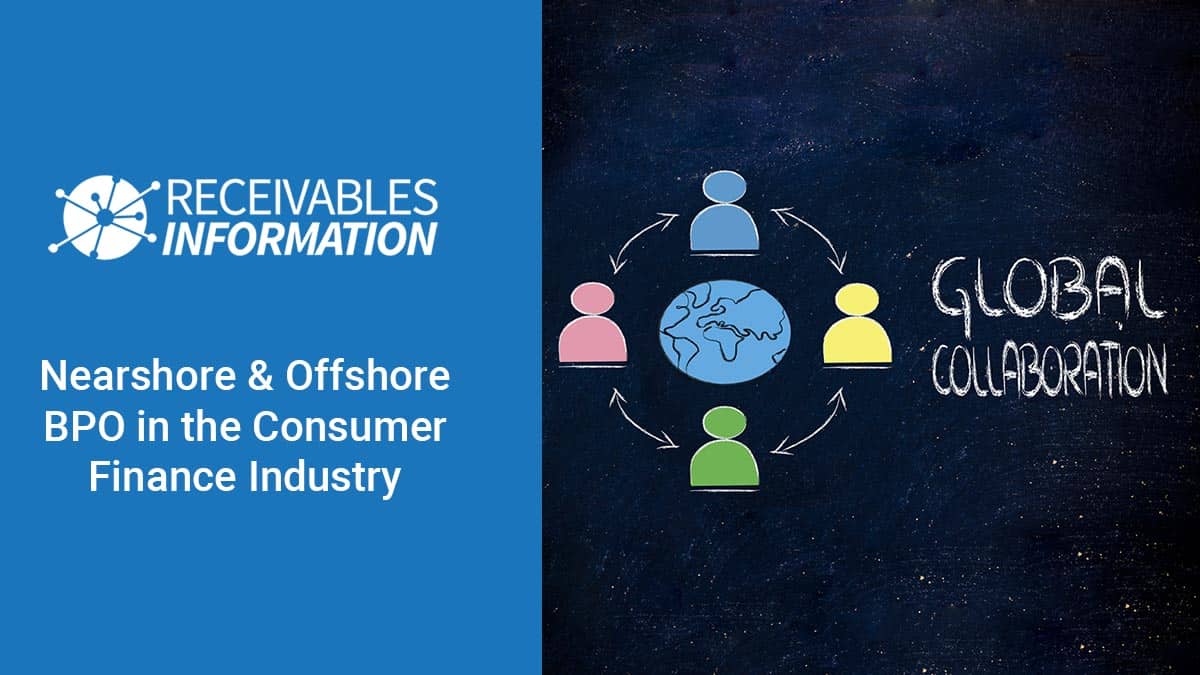
Nearshore & Offshore BPO in the Consumer Finance Industry
What is BPO?
BPO, or Business Process Outsourcing, is a business strategy increasingly common today in the global business market. BPO refers to the subcontracting of various business processes to outside 3rd party subcontractors. Businesses might outsource onshore/domestically within the country, nearshore to countries and locations relatively close by (nearshore BPO centers relative to the US may be located in the Caribbean or Latin America, for instance), or offshore to a country outside/distant to the business headquarters.
BPO & the ARM Industry
While outsourcing pieces of operations has long been common to manufacturing, it has also grown increasingly common in the technology and finance industries. The ARM industry is full of companies serving as outsourced call/collection/customer service centers on behalf of creditor clients across multiple sectors including finance, healthcare, utilities, education, and government. Many of those companies may utilize BPO relationships themselves for portions of operations such as lettering (hence the industry-wide concern over the Hunstein case).
This article, however, will focus on nearshore and offshore BPO specifically, and how those relate to the current and possible future evolution of the industry and the global business marketplace.
Technology Developments & BPO Globalization
One reason for the increased availability of non-domestic BPO opportunities is the overall global growth in infrastructure to support remote work in emerging markets. Additionally, as technology continues to develop, there are more tools to make remote work not only possible but more importantly, secure.
Virtual private networks (VPNs), multi-factor authentication (MFA), and “cloud-based” data storage are a few of the technology shifts that have dramatically expanded affordable, secure data sharing possibilities. As a result of technology and connectivity improvements around the world, the business landscape is becoming more globalized and interconnected daily.
Remote Work & Disruption by Fintech
Demand for BPO services also seems to be increasing. One key reason is the disruption fintech is causing in the traditional consumer finance business models. There is a declining need for as many physical banking buildings and geography-based staffing. Another factor in the recent growth of the BPO industry is the increase in remote work as a result of the Covid-19 pandemic.
Organizational cultures and processes now lend themselves more easily to remote work in general in many cases, as so many businesses were recently forced to adjust and think outside the norms. Combine that with the need to conserve resources and cut costs, and BPO options may look even more feasible and appealing to businesses than they may previously have seemed.
Pros and Cons of Outsourcing
Businesses generally make the decision to outsource or not based on the advantages and disadvantages specific to the needs and resources of the company. A business may be drawn to the reduction in employee expenses such as healthcare and higher labor costs, for instance. There is also the benefit of access to a larger talent pool. Challenges may include language barriers, time zones, and physical accessibility.
Non-domestic BPO market leaders note the success of partnering with an outsourcing group as dependent on key factors including vetting and choosing the right fit, creating a culture of confidentiality, and ensuring adequate informational and physical security. Compliance and risk management are critical with any role involving sensitive consumer data, and the ability to monitor and minimize risk is always a crucial component to consider.
New Horizons
As new markets continue to emerge and connectivity continues to increase, businesses in the consumer finance industry may be increasingly impacted by new sources of efficiency and new sources of competition within the global BPO market. With the rapid expansion of fintech and mobile banking, it will be interesting to see how domestic and international companies position themselves for prospective clients and how outsourcing models evolve.
Learn More
To learn more about the ARM industry as a whole, follow Receivables Info on Facebook , LinkedIn, and YouTube. Be sure to also check out our Money Chat series for more ways to stay financially literate while exploring the receivables landscape.
About Receivables Info
The ReceivablesInfo team is led by receivables management industry veterans who wanted to create a website for the industry, by the industry. Their goal is to provide a voice to high-quality debt buyers, collection agencies, law firms, and industry veterans to share information about their businesses and their place within the marketplace and the community. The website provides relevant news alerts, articles, videos, and other receivables-related information to industry partners and colleagues around the industry and the globe. Receivables Info is also home to financial education resources for consumers through series like Money Chat.
The information contained in this article is meant to serve as general guidance for entry-level to mid-level ARM industry professionals and is not meant to serve as comprehensive business, legal, or financial advice.




